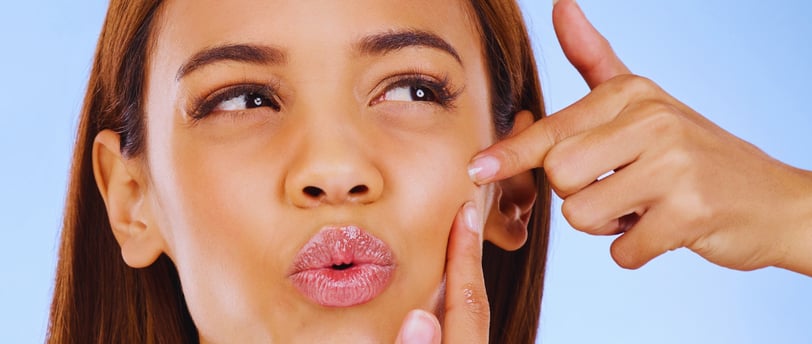Can I Pop a Pimple? The Truth About Popping Pimples
Is popping a pimple really worth it? This blog dives into the risks and consequences of pimple popping, safe methods if you absolutely must do it, and effective alternatives to treat pimples without damaging your skin. Learn how to prevent breakouts, care for your skin, and handle those pesky bumps the right way for healthier, clearer skin! 🌸✨
SKINCARE
12/6/20243 min read


We’ve all been tempted to pop a pimple that’s ruining our day, but is it really a good idea? While popping a pimple may seem like a quick fix, it can actually do more harm than good. In this blog, we’ll explore the risks of pimple popping, the right way to handle breakouts, and safe alternatives to get rid of pimples without causing damage to your skin.
Why Do Pimples Form?
Pimples occur when your skin’s pores get clogged with oil, dead skin cells, and bacteria. There are several types of pimples, including:
Whiteheads: Closed pores filled with pus.
Blackheads: Open pores clogged with oil and dirt.
Inflamed pimples: Red, swollen bumps caused by bacteria.
Cysts: Deep, painful pimples filled with pus.
While whiteheads and blackheads might seem easy to pop, doing so can worsen the situation.
What Happens When You Pop a Pimple?
Popping a pimple forces the trapped oil, bacteria, and debris out of the pore. However, this process can:
Push Bacteria Deeper: Improper popping can push bacteria further into the skin, causing more inflammation.
Cause Scarring: Pimple popping can damage the skin, leading to permanent scars or dark spots.
Spread Infection: Squeezing a pimple can spread bacteria to surrounding areas, causing more breakouts.
Delay Healing: Popped pimples take longer to heal than untreated ones.
Should You Ever Pop a Pimple?
Dermatologists generally advise against popping pimples. However, if you must pop a pimple, it’s important to do it safely to minimize damage.
How to Safely Pop a Pimple (If You Must)
If the pimple is a whitehead (a pus-filled bump with a visible white tip), follow these steps:
Wash Your Hands and Face: Start with clean hands and a clean face to prevent infection.
Use a Warm Compress: Apply a warm compress for 5-10 minutes to soften the skin and make extraction easier.
Sterilize a Needle: Use a clean, sterilized needle or pin to gently pierce the whitehead.
Gently Squeeze: Wrap your fingers in clean tissue and gently press around the pimple, not directly on it. Stop if nothing comes out easily.
Apply an Antiseptic: Dab the area with an antiseptic or spot treatment to prevent infection.
When NOT to Pop a Pimple
Avoid popping pimples in these cases:
No Visible Whitehead: If the pimple is deep under the skin, it’s not ready to be popped.
Inflamed or Painful Pimples: Leave red, swollen bumps or cystic acne to heal naturally or consult a dermatologist.
Near Sensitive Areas: Avoid popping pimples near the eyes, nose, or lips, as these areas are more prone to infection.
Safe Alternatives to Popping Pimples
Instead of popping, try these safe methods to get rid of pimples:
1. Use a Spot Treatment
Apply products with ingredients like benzoyl peroxide, salicylic acid, or tea tree oil to reduce inflammation and kill bacteria.
2. Try a Warm Compress
Hold a warm compress against the pimple for 10 minutes to reduce swelling and help it heal faster.
3. Apply an Acne Patch
Acne patches absorb pus and protect the pimple from bacteria, speeding up healing without popping.
4. Let It Heal Naturally
Most pimples heal on their own in a few days. Be patient and let your skin do its job.
How to Prevent Pimples
To avoid the temptation to pop, focus on preventing pimples:
Cleanse Your Skin: Wash your face twice daily with a gentle cleanser.
Exfoliate Weekly: Use a mild exfoliant to remove dead skin cells.
Moisturize Daily: Use a non-comedogenic moisturizer to keep your skin hydrated.
Avoid Touching Your Face: Keep your hands off your face to prevent transferring bacteria.
Use Sunscreen: Protect your skin from UV damage, which can worsen acne.
What to Do After Popping a Pimple
If you’ve already popped a pimple, here’s how to minimize damage:
Clean the Area: Wash your face with a gentle cleanser.
Apply an Antiseptic: Dab the area with tea tree oil or an alcohol-free toner.
Keep It Moisturized: Apply an aloe vera gel or a non-comedogenic moisturizer.
Avoid Touching It Again: Leave the area alone to heal.
Use Sunscreen: Protect the spot from sun exposure to prevent dark marks.
When to See a Dermatologist
If you experience frequent or severe acne, it’s best to consult a dermatologist. They can provide professional treatments like:
Prescription topical or oral medications.
Chemical peels to reduce acne and scars.
Cortisone injections for cystic acne.
Only fully-formed whiteheads with a visible white tip are relatively safer to pop if done correctly.
Conclusion
While popping a pimple may seem satisfying, it’s usually not worth the risks of scarring, infection, or prolonged healing. Instead, try safe alternatives and focus on prevention to keep your skin clear and healthy.
Frequently asked questions
1. Can popping a pimple cause permanent scars?
Yes, popping pimples can damage the skin and lead to permanent scarring or dark spots.
2. How long does a pimple take to heal if left alone?
Most pimples heal within 3-7 days if left untouched.
3. Are there any pimples that are safe to pop?
Only fully-formed whiteheads with a visible white tip are relatively safer to pop if done correctly.
Explore
Discover tips for skincare, bodycare, and haircare.
Contact-
© 2024. All rights reserved.
